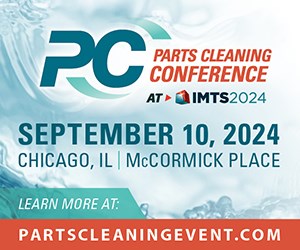Navy Developing Coating to Reduce Ship Fuel, Energy Costs
It can repel water, oil, alcohol and even peanut butter, and it might save the U.S. Navy millions of dollars in ship fuel costs, reduce the amount of energy that vessels consume and improve operational efficiency.
It can repel water, oil, alcohol and even peanut butter. And it might save the U.S. Navy millions of dollars in ship fuel costs, reduce the amount of energy that vessels consume and improve operational efficiency.
The Office of Naval Research (ONR) is sponsoring work by Dr. Anish Tuteja, an associate professor of materials science and engineering at the University of Michigan, to develop a new type of “omniphobic” coating. This chemical coating is clear and durable, can be applied to numerous surfaces, and sheds just about any liquid.
Of particular interest to the Navy is how omniphobic coatings can reduce friction drag—resistance created by the movement of a hull through water—on ships, submarines and unmanned underwater vessels.
Compare friction drag to jogging through a swimming pool. Because of the water’s resistance, each stride is more difficult and requires more energy and effort. A significant percentage of a ship’s fuel consumption — up to 80 percent at lower speeds and 40-50 percent at higher speeds — goes toward maintaining its speed and overcoming friction drag,.
“If we could find a way to drastically reduce friction drag, vessels would consume less fuel or battery power, and enjoy a greater range of operations,” says Dr. Ki-Han Kim, a program officer in ONR’s Sea Warfare and Weapons Department
While repellent coatings aren’t new, it’s hard to create one that resists most liquids and is tough enough to stick to various surfaces for long periods of time.
“Researchers may take a very durable polymer matrix and a very repellent filler and mix them,” says Tuteja. “But this doesn’t necessarily yield a durable, repellent coating. Different polymers and fillers have different miscibilities. Simply combining the most durable individual constituents doesn't yield the most durable composite coating.”
To engineer their innovative coating, Tuteja and his research team studied vast computer databases of known chemical substances. They then entered complex mathematical equations, based on each substance’s molecular properties, to predict how any two would behave when blended. After analyzing hundreds of combinations, researchers found the right mix.
The molecular marriage was a hit during laboratory tests. The rubber-like combo can be sprayed, brushed, dipped or spin-coated onto numerous surfaces, and it binds tightly. The coating also can withstand scratching, denting and other hazards of daily use. And the way the molecules separate makes the coating optically clear.
Besides reducing friction drag, Tuteja envisions other Navy uses for the omniphobic coating—including protecting high-value equipment like sensors, radars and antennas from weather.
In addition to omniphobic coatings to lessen friction drag, ONR is sponsoring other types of coating research to prevent corrosion on both ships and aircraft and fight biofouling (the buildup of barnacles on hulls). Similar coatings can also prevent ice from forming on ships operating in cold regions, or make ice removal much easier than conventional methods like scraping.
Tuteja’s team is conducting further tests on the omniphobic coating, but they plan to have it ready for small-scale military and civilian use within the next couple of years.
Warren Duffie Jr. is a contractor for ONR Corporate Strategic Communications.
Related Content
PPG Paints, Coatings for Battery EVs Showcased at Germany Battery Show
PPG is attending The Battery Show in Stuttgart, Germany.
Read MoreNASF/AESF Foundation Research Project #122: Electrochemical Approaches to Treatment of PFAS in Plating Wastewater - 10th Quarterly Report
The NASF-AESF Foundation Research Board selected a project addressing the problem of PFAS and related chemicals in plating wastewater streams. This report covers the 10th quarter of work (April-June 2023). Here, we examine the effect of surface fluorination of Ti4O7 anodes on PFAS degradation performance in terms of energy performance as well as formation of chlorate and perchlorate when chloride is present in the solution. The full paper on this work can be accessed and printed at short.pfonline.com/NASF24Feb2.
Read MoreNASF/AESF Foundation Research Project #123: Electrochemical Manufacturing for Energy Applications – 4th and 5th Quarter Report
The NASF-AESF Foundation Research Board selected a project on electrodeposition toward developing low-cost and scalable manufacturing processes for hydrogen fuel cells and electrolysis cells for clean transportation and distributed power applications. During the reporting period, efforts were focused on planning the overall project work, with the eventual goal of manufacturing an improved design for a Solid oxide fuel cell anode supported flat tube (SOFC).
Read MoreSolar-Powered Photonic Cooling Enables Energy-Saving Coating
Passive cooling technology can reduce interior temperatures 5-13°C, offering weight, cost and CO2 benefits for cars, construction, aircraft and more.
Read MoreRead Next
The 2024 Ford Mustang: All the Colors Available
Although Chevrolet has announced the end of the Camaro and Dodge is offering “Last Call” editions of the Charger and Challenger, the Ford Mustang is launching to its seventh generation.
Read MorePowder Coating 4.0: Smarter, Faster, More Efficient and Connected
New tools reduce cost and waste, lower manufacturing footprint of powder coating operations.
Read MoreEpisode 42: An Interview with Robin Deal, Hubbard-Hall
Hubbard-Hall wastewater treatment specialist Robin Deal discusses the latest trends in wastewater management.
Read More

























